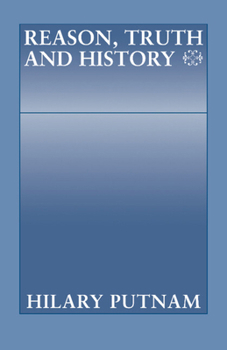Reason, Truth and History
Select Format
Select Condition 
Book Overview
Hilary Putnam deals in this book with some of the most fundamental persistent problems in philosophy: the nature of truth, knowledge and rationality. His aim is to break down the fixed categories of thought which have always appeared to define and constrain the permissible solutions to these problems.
Format:Paperback
Language:English
ISBN:0521297761
ISBN13:9780521297769
Release Date:December 1981
Publisher:Cambridge University Press
Length:236 Pages
Weight:0.67 lbs.
Dimensions:0.7" x 5.5" x 8.2"
Customer Reviews
4 ratings
Important work in the Western analytic philosophical style
Published by Thriftbooks.com User , 18 years ago
This is a review of Reason, Truth and History by Hilary Putnam. Hilary Putnam (born 1926) is one of the leading philosophers in the English-speaking world in the 20th (and early 21st) century. He is in the "analytic" philosophical tradition, which emphasizes rigorous argumentation and incorporating into philosophy the insights of science and mathematics, so his work is sometimes technical. This book is a combination of ingenious but difficult arguments (there is an appendix that contains a formal mathematical proof of one of his claims) with much more readable discussions of issues of general philosophical interest. I have met Putnam in person, and this book gives you a feel for what he is like: brilliant, intellectually broad and quick, but sometimes a bit glib. Putnam has fundamentally changed his philosophical views several times. (He published this book in 1981.) But you will get a taste of his most famous claims from this work. There is a warning on p. viii that many readers may want to begin with Chapter 5 (a non-technical chapter). This is good advice. I am a professional philosopher, and even I found my eyes glazing over at points in Chapters 1-4. Overall, you can see Putnam as *rejecting* the following common conception. The content of the meanings of our words and our beliefs is given by something internal to our minds or brains. Our beliefs are true just in case they "correspond" to a world that is completely independent of our beliefs. Science is the best (and perhaps the only) method for determining the correspondence between beliefs and the world. Science can "prove" its claims via a strict, logical scientific method. Ethics and values are subjective matters of opinion, since they are not proveable like science. Putnam is similar to many critics (including Thomas Kuhn, Paul Feyerabend and the so-called "postmodern" philosophers) in recognizing that the picture given by the preceding paragraph must (and I mean MUST) be mistaken. The content of our beliefs and concepts is determined, in part, by things external to them (Chapter 1). There is no way to make sense of concepts and beliefs corresponding to the world, at least not if we think of the world as completely independent of our mental states (Chapter 2). The methodology of science cannot be reduced to formal logic and mathematics (Chapter 8). Fact and value cannot be neatly separated (Chapter 6). However, Putnam diverges from many "postmodernists" in rejecting relativism and wanting to maintain some notions of truth and rationality. His basic move is to say that we can continue to ask questions like "What is real?" "Is theory A more rational than theory B?" and "Is X true?" but we can only ask them internally to our theories. Putnam argues that this does not land us in relativism or chaos because we are committed (by the very nature of our human practices) to treating other humans as rational in a way that is comprehensible to us (even if we end up disa
Hilary Putnam has a lot to answer for ...
Published by Thriftbooks.com User , 21 years ago
When I was about ten years old on holiday, I made a big fuss about being bored, because I'd read all the books I'd brought with me. So, my Dad lent me a copy of this book, and I struggled through the first chapter. Now I'm teaching philosophy. My Dad always said that he regrets not lending me a book about engineering.
Philosophy Analytically Done
Published by Thriftbooks.com User , 23 years ago
Analytic philosophy is often forebidding, and Prof. Putnam is a quintessential analytic philosopher. But, for those wanting an accessible book to try their minds in the analytical tradition without being overwhelmed, this is a nice start. The "Brains in a Vat" chapter is a bit tiresome as an analytic tool, but the remainder of the book is less obscure and more provocative. The book covers metaphysics, value theory, ethics, and epistemology in a highly engaging manner. If only more analytic philosophers wrote with such clarity and easy style. Don't be fooled. This book will be a mental workout, but one you'll enjoy rather than belabor.
Contents
Published by Thriftbooks.com User , 27 years ago
Preface, 1. Brains in a vat, 2. A problem about reference, 3. Two philosophical perspectives, 4. Mind and body, 5. Two conceptions of rationality, 6. Fact and value, 7. Reason and history, 8. The impact of science on modern conceptions of rationality, 9. Values, facts and cognition, Appendix, Index. (It referes paperback edition, 1995.)






